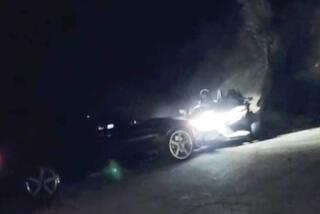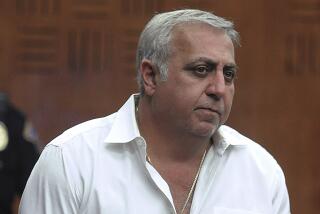A Formula for Fraud? : Honda Kickbacks Are Old Story to Some Auto Industry Veterans
- Share via
When consumers were clamoring for Honda’s highly dependable cars in the early 1980s, longtime Southern California car dealer Bob Estes put in his bid for a Honda franchise.
With his Beverly Hills location, solid financing and 40 years’ experience selling Volkswagens, Porsches, Lincolns and Mercurys, Estes figured he would land a dealership with ease. “I’d known Honda since they first came to the country, and they loved my facilities,” said Estes, who has since retired but still holds a dealer license.
Negotiations took an unexpected twist, though, when another dealer described “a little deal” that he said required new dealers to pay a surcharge of $150 a car to a Honda sales executive in the Midwest.
“I told them to kiss off,” said Estes, a past president of the California Motor Car Dealers Assn. “I was insulted that they’d come at me that way. . . . I’d never bought a dealership in my life, and I wasn’t going to start.”
Federal investigators on March 14 said they had filed criminal charges against 13 former American Honda Motor Co. executives, including seven who lived in Orange County, in connection with alleged kickbacks and bribes during the 1980s. Estes says he wonders now whether “I should have gone along for a little while and then rung a bell.”
Honda executives last week would not comment on Estes’ allegation or an ongoing FBI investigation. Federal agents allege that as many as 13 Honda and Acura division executives defrauded Torrance-based American Honda out of $10 million. Since October, eight former Honda and Acura executives have pleaded guilty to fraud-related charges and five more former executives have been indicted on criminal charges.
Estes and others in the automobile and motorcycle sales business say that they were not surprised to learn of the federal investigation.
“The fact that it has taken this long for the issue of dealer payoffs to Honda to come to light is nothing short of amazing,” said Don Moery, national sales manager for Yamaha Motor Corp. until 1990. “These payoff stories have been out there for a long time.”
*
Search warrants, indictments and other court papers generated by the yearlong FBI investigation are peppered with allegations of bribes and kickbacks, including $750,000 linked to a Moreno Valley dealership, $50,000 to a dealership in Round Rock, Tex., and $100,000 to an Acura franchise in Cocoa Beach, Fla.
Investigators also allege that the former executives pocketed funds earmarked for dealer advertising campaigns, took kickbacks from vendors who supplied training programs for dealers’ employees and earned under-the-table profits by reselling damaged cars to dealers.
American Honda said its internal investigation into possible fraud uncovered “isolated policy violations.” But the complexity of the schemes “made it difficult for us to immediately detect and identify them as interrelated,” the company stated.
But Estes said he told Honda Motor Co.’s founder, the late Soichiro Honda, about the alleged kickback scheme shortly after abandoning his own attempt to win a dealership: “I let him know (through an interpreter) what was going on. I told him of my dissatisfaction, so the company knew what was going on.”
FBI agents and federal authorities outlined some of the alleged schemes in search warrants, indictments and other documents. Some of the schemes they describe are relatively simple: Executives bought damaged cars from the company at a discount, and generated thousands of dollars in illegal profits by reselling them to dealers.
Other operations were more complicated. Court documents allege that Newport Beach resident Edward A. Temple, a former Honda zone manager who now owns Costa Mesa Honda, played a key role in at least two schemes.
Temple, a Honda employee from 1981 to 1989, pleaded guilty in October to one count of conspiracy in connection with the fraud investigation. His office referred questions about the investigation to Honda executives in Torrance, who would not comment.
Indictments and other papers filed in U.S. District Court in Santa Ana and in Concord, N.H., portray Temple as “a close confidant” of Stanley James Cardiges, formerly the top sales executive in the Honda division, who was indicted on criminal fraud charges on March 14.
Investigators allege that Temple, Cardiges and others at American Honda steered potentially lucrative Honda and Acura franchises to “straw dealers”--groups that had no intention of remaining in business. After American Honda awarded dealerships to the bogus groups, court documents state, the exclusive franchises were sold, generating kickbacks ranging from $250,000 to $1 million.
Federal investigators say that Temple, Cardiges and other Honda executives also took illegal stakes in partnerships that were competing for Honda and Acura dealerships. In 1987, investigators allege, Temple and Cardiges steered a dealership to a businessman in Arkansas in return for a 25% stake in the operation.
The Honda executives each received checks for $162,000 after the dealership was sold, according to court documents. Cardiges subsequently demanded that Temple prepare a fraudulent promissory note to mislead Honda’s internal investigation, federal investigators allege.
*
Cardiges, arrested March 11 at his home in Laguna Hills, pleaded not guilty Thursday during a brief appearance in U.S. District Court in Concord, N.H.
“We’re confident the evidence will ultimately show that Jim Cardiges didn’t defraud anyone, including American Honda,” his lawyer, Philip D. Israels of Sherman Oaks, said at the hearing. Israels described Cardiges--who is charged with racketeering--as a scapegoat.
Cardiges remains free on bail pending a trial scheduled for June 7.
Investigators allege that Cardiges also worked on illegal schemes with several other former Honda sales executives, including Corona del Mar resident Mark L. Benson, who was Honda’s assistant zone manager in Connecticut until 1991. In October, Benson, who also has declined to comment on the investigation, pleaded guilty to one count of mail fraud in connection with the awarding of dealerships in Connecticut and New York state.
In a related search warrant unsealed March 14 in Santa Ana, investigators allege that Benson received $250,000 after helping to steer a franchise to a dealer in Auburn, N.Y., and $150,000 and a $40,000 Porsche in return for influencing the outcome of an application in Westerly, R.I.
A handful of Honda executives, investigators allege, also misused millions of dollars in advertising and dealer-training funds.
Investigators maintain that Cardiges and former Honda executive Dennis R. Josleyn, who lives in Southern California, took about $2.5 million in kickbacks in 1991 and 1992. Josleyn and Cardiges could be sentenced to 30 years in prison if convicted of racketeering, mail fraud and conspiracy charges.
Investigators allege that the two men steered funds from Honda dealers across the country to an unidentified company that provided direct-mail advertising and marketing programs--and kicked back payments to the Honda executives.
Josleyn, a nine-year Honda veteran whose last position was West Coast manager for Acura, was unavailable for comment. Honda officials would not comment other than to state that executives are prohibited from taking gifts or investing in companies that have transactions with the auto maker.
But court records show that the former Honda executive’s brother was the head of an advertising agency that did business with the Honda and Acura divisions. Josleyn claimed to be owed $200,000 from a now-defunct Yorba Linda advertising agency that went bankrupt in 1992. The agency, Garey & Associates, was owned by his brother, Don Gary Josleyn.
*
Between 1989 and early 1992, the advertising agency did business with Honda and Acura, said Carolyn Davis, credit manager for Colorgraphics, a Los Angeles printing company that is still owed more than $100,000 by the failed agency. “We knew that (Don Gary’s) brother worked for Honda,” Davis said.
“Most of the work we did (for Garey) was related in one way or another to Honda and Acura,” Davis said. Colorgraphics also printed a sales brochure for Worldwide Dyve Inc., a now-defunct sports apparel company owned by Cardiges.
In court records, Don Josleyn stated that his ad agency went out of business in the spring of 1992 because it had lost its two major clients. The bankruptcy filing--which showed more than $12 million in gross income between 1988 and 1991--indicated that the firm had $1.4 million in liabilities and no assets.
Colorgraphics’ last American Honda order from Garey came in February, 1992. And, according to Honda, Dennis Josleyn left Honda in April, 1992, just months before Garey & Associates entered bankruptcy.
Colorgraphics executives recall being baffled at the time, because Josleyn’s agency had paid its bills promptly for two years. Colorgraphics eventually filed a civil lawsuit against the failed company seeking $160,000 in unpaid bills. The case was settled through the bankruptcy court with a payment of $50,000.
“That was better than nothing,” Davis said. “From looking at the bankruptcy filing, it appeared that to look for anything more would have been beating a dead horse.”
The Associated Press contributed to this report.






